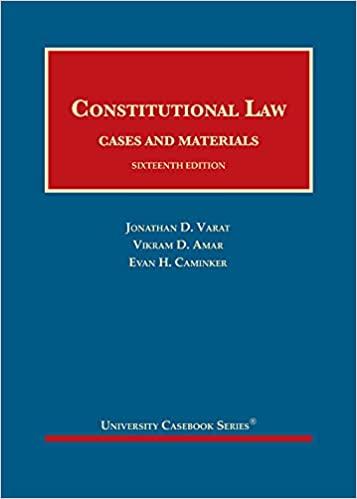Answered step by step
Verified Expert Solution
Question
1 Approved Answer
John Bull, a wine and spirit merchant in England, arranged for a cargo of Canadian Whisky to be shipped from Canada to Seoul, South Korea;
John Bull, a wine and spirit merchant in England, arranged for a cargo of Canadian Whisky to be shipped from Canada to Seoul, South Korea; for a cargo of Bourbon to be shipped to Taipeh, Taiwan; and for a cargo of Californian Wine to be shipped from San Franscisco, USA to Hong Kong. John Bull arranged free in and out contracts of carriage, subject to English Law and Jurisdiction, with The Booze Carrier Co, owners of the m.v. Hooch, on terms permitting transhipment on best terms available. The Canadian Whisky was loaded aboard the m.v. Hooch at Vancover. A clean bill of lading stating "weight and quantity unknown" was issued in respect of the cargo. It is later discovered that there were discrepancies between the invoice and the bill of lading regarding markings on the cases of whisky. The m.v. Hooch proceeded to San Franscisco where the wine and the bourbon was loaded. The clean bills of lading issued in respect of these cargoes excluded liability for wrongful acts of third parties. Whilst the new cargo was being loaded at San Franscisco a number of crates of Canadian Whisky were damaged by careless stevedores who decided to drink the contents of a number of loose bottles which fell out of the damaged crates. During the voyage to Seoul bad stowage resulted in a number of cases of bourbon breaking loose from their ties and smashing during stormy weather. Booze Carrier Co issued bills of lading, subject to English Law and London Arbitration, out of their London office to John Bull in respect of the 3 cargoes. Canada is a signatory to the Hague Visby Rules. The bill of lading in respect of the Canadian Whisky covered shipment from Vancover to Seoul. The US is a signatory to the Hague Rules but the bills of lading in respect of the wine and the bourbon, covering shipment from San Fransisco to Taipeh did not incorporate the Hague Rules. John Bull sold the whisky to Rod, the bourbon to Sam and the wine to Ted. Each buyer paid John Bull on endorsement of documents for their respective cargoes. The m.v.Hooch then proceeded to Seoul and discharged the Canadian Whisky before proceeding to Taipeh where the bourbon was discharged and the wine transhipped aboard the m.v. Saki bound for Hong Kong. The bill of lading, subject to Taiwanese Law and Jurisdiction, issued by the Plonk co, owners of the m.v. Saki, excluded liability for damage caused by unseaworthiness of the vessel and required all claims in respect of cargo loss or damage to be made within 3 months of the incident causing the loss. The m.v. Saki, which was clearly unseaworthy, started to flounder in heavy seas during the voyage from Taipeh to Hong Kong and the master ordered the cargo of wine to be jettisoned over board in order to save the vessel. The vessel limped into Hong Kong three months and a half months later. Advise Rod, Sam and Ted of their rights and liabilities regarding the events outlined above, with specific reference to The Hague and Hague Visby Rules
Step by Step Solution
There are 3 Steps involved in it
Step: 1

Get Instant Access to Expert-Tailored Solutions
See step-by-step solutions with expert insights and AI powered tools for academic success
Step: 2

Step: 3

Ace Your Homework with AI
Get the answers you need in no time with our AI-driven, step-by-step assistance
Get Started


